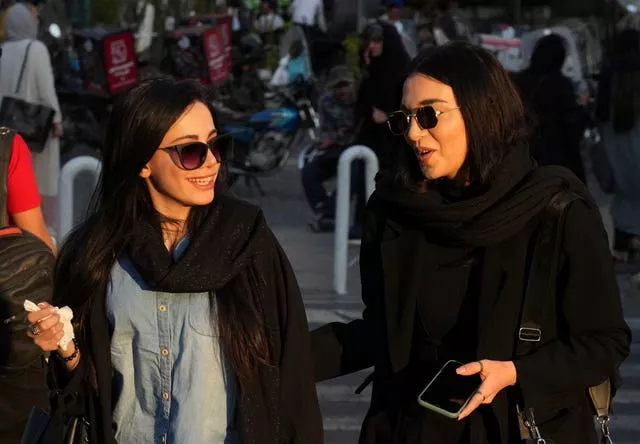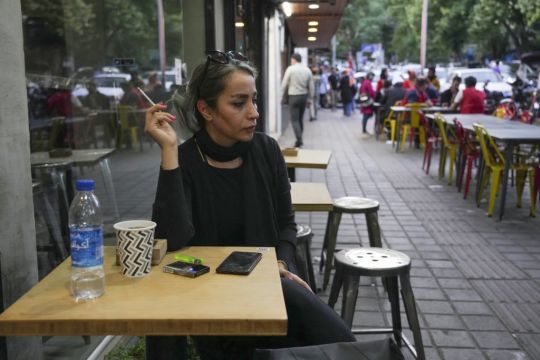More women in Iran are choosing not to wear headscarves, months after protests over the death of 22-year-old Mahsa Amini in the custody of the country’s morality police for wearing her hijab too loosely.
Billboards across the country’s capital proclaim that women should wear their mandatory headscarves to honour their mothers but perhaps for the first time since the chaotic days following Iran’s 1979 Islamic Revolution, more women — both young and old — are opting not to.
While the demonstrations appear to have cooled, the decision by some women not to cover their hair in public poses a new challenge to the country’s theocracy. The women’s pushback also lays bare schisms in Iran that had been veiled for decades.
Authorities have made legal threats and closed down some businesses serving women not wearing the hijab. Police and volunteers issue verbal warnings in subways, airports and other public places. Text messages have targeted drivers who have women without head coverings in their vehicles.

But analysts in Iran warn that the government could reignite dissent if it pushes too hard.
The protests erupted at a difficult time for the Islamic Republic, struggling with economic woes brought on by its standoff with the West over its rapidly advancing nuclear programme.
Some women said they had had enough — no matter what the consequences were. They said they were fighting for more freedom in Iran and a better future for their daughters.
Some suggested the growing numbers of women joining their ranks might make it harder for the authorities to push back.
“Do they want to close down all businesses?” said Shervin, a 23-year-old student whose hair was uncovered. “If I go to a police station, will they shut it down too?”

Vida, 29, said a decision by her and two of her friends to no longer cover their hair in public was about more than headscarves.
“This is a message for the government, leave us alone,” she said.
Iran and neighbouring Taliban-controlled Afghanistan are the only countries where the hijab remains mandatory for women.
Before protests erupted in September, it was rare to see women without headscarves, though some occasionally let their hijab fall to their shoulders.
Today, it is routine in some areas of Tehran to see women without headscarves.
While at first Iran’s government avoided a direct confrontation over the issue, it has increasingly flexed the powers of the state in recent weeks in an attempt to curb the practice.
In early April, Iran’s Supreme Leader Ayatollah Ali Khamenei declared that “removing hijab is not Islamically or politically permissible”.
Ayatollah Khamenei claimed women refusing to wear the hijab were being manipulated.
“They are unaware of who is behind this policy of removing and fighting hijab,” Mr Khamenei said.
“The enemy’s spies and the enemy’s spy agencies are pursuing this matter. If they know about this, they will definitely not take part in this.”
Hard-line media began publishing details of “immoral” situations in shopping malls, showing women without the hijab.
On April 25, authorities closed the 23-storey Opal shopping mall in northern Tehran for several days after women with their hair showing were seen spending time together with men in a bowling alley.
Police have also shut down over 2,000 businesses across the country after they admitted women not wearing the hijab, including shops, restaurants and even pharmacies, according to the reformist newspaper Shargh.
Government offices no longer provide services to women not covering their hair, and the head of the country’s track and field federation, Hashem Siami, resigned this weekend after some participants in an all-women half-marathon in the city of Shiraz competed without the hijab.
And there are signs the crackdown could escalate.
Some clerics were urging the deployment of soldiers, as well as the all-volunteer Basij force of Iran’s paramilitary Revolutionary Guard, to enforce the hijab law.
Police also said that surveillance cameras with “artificial intelligence” would find women not wearing their head covering.
“The fight over the hijab will remain centre stage unless the government reaches an understanding with world powers over the nuclear deal and sanctions relief,” Tehran-based political analyst Ahmad Zeidabadi said.
But diplomacy has stalled and anti-government protests could widen, he said.
The hijab “will be the main issue and the fight will not be about scarves only”.







